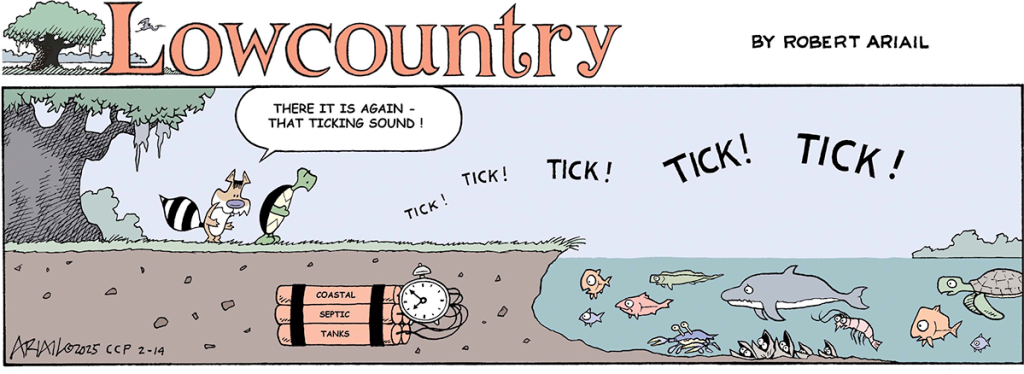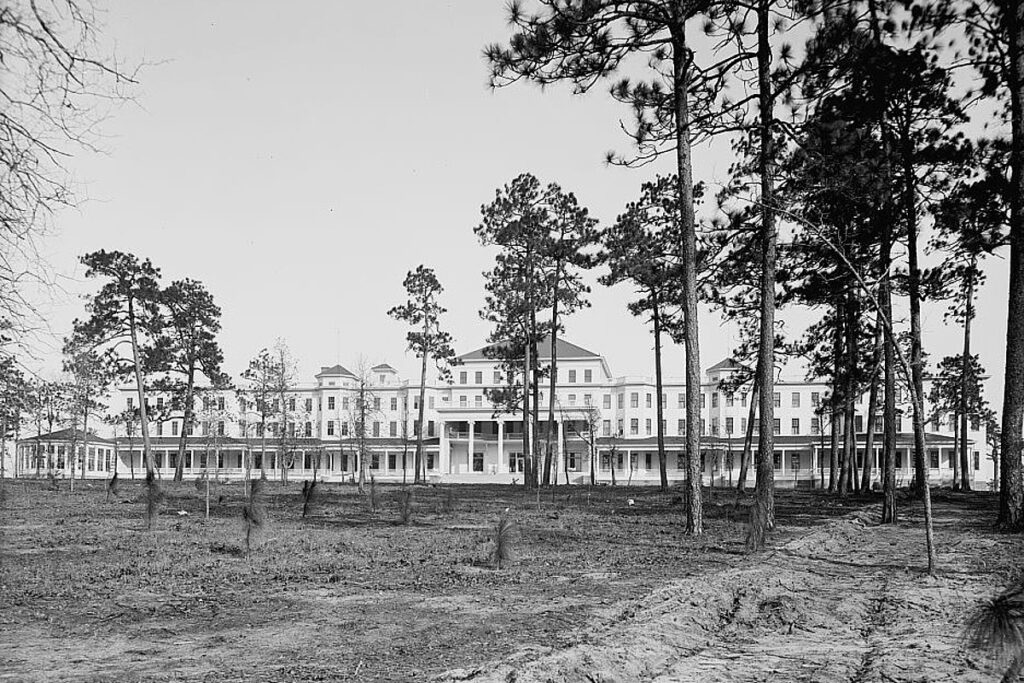STATEHOUSE REPORT | ISSUE 24.07 | Feb. 14, 2025
- BIG STORY: Liquor liability crisis continues to divide
- MORE NEWS: Now you see him, now you don’t
- LOWCOUNTRY, Ariail: A ticking time bomb
- BRACK: Term limits are solution in search of problem
- MYSTERY PHOTO: Big place
- FEEDBACK: On fear-mongering stunt
Liquor liability crisis continues to divide lawmakers
By Jack O’Toole, Capitol bureau | If there’s one thing that everyone involved in South Carolina’s liquor liability debate seems to agree on, it’s that bar and restaurant owners need fast relief from the sky-high insurance rates that are putting too many of them out of business.

“Small businesses are struggling while politicians dither,” said Democratic S.C. Sen. Ed Sutton, whose Charleston district contains more bars and restaurants than any other in the state. “Every week that goes by, another VFW post or restaurant closes up shop because their premiums increased tenfold or more in the span of two years.”
Bar and restaurant owners, plaintiffs’ attorneys and lawmakers of both parties echoed those concerns in recent City Paper interviews.
“Last week, two places closed in Charleston and two closed in Greenville the week before,” said Christopher Smith, executive director of the S.C. Bar and Tavern Association. “It’s just a continuing trend across the state.”
But the definition of the problem is where the consensus ends — and where a series of difficult, divisive questions about judicial fairness, victims’ rights and the insurance industry’s opaque business practices begin.
Two bills currently being debated in the S.C. Senate, each of which aims to reduce liquor liability premiums, bring those questions into sharp relief.
Lawsuit reform
Introduced by S.C. Sen. Majority Leader Shane Massey (R-Edgefield), S. 244 is a broad lawsuit reform bill, also known as a “tort reform” measure, that supporters argue would bring down liquor liability rates by ensuring insurance companies pay for only the harm their client directly caused.
Under current law, defendants in civil suits can be required to pay 100% of the damages if a jury finds they are responsible for more than 50% of the harm – or in the case of businesses selling alcohol, as little as 1%. In other words, if a bar were to be found to just have 1% of the liability in a case, it could – at least in theory – face paying all of the damages for the case.
Experts say the law was designed to ensure that victims — in liquor liability cases, usually drunk driving victims or their survivors — receive their full jury award when some responsible parties can’t afford to pay.
“It’s not fair for an injured person not to be able to recover 100% of his damages,” Massey said in a Feb. 6 Senate Judiciary Committee hearing. “But the current law allows for one party to be 100% responsible even if we acknowledge that he didn’t cause all 100% — and that’s not fair either.”
A recent poll of South Carolina residents conducted by the conservative-leaning S.C. Policy Council found that a majority of state residents — 63% — support Massey’s lawsuit-reform approach in concept.
But Rep. Gil Gatch (R-Dorchester), a civil litigator who represents clients who’ve been harmed by drunk drivers, argues Massey’s bill would just flip the system’s unfairness from a wrongdoer’s insurance company onto the victim.
“What about the single mom who’s in a car accident with her kid and there’s a catastrophic injury, and because of tort reform their percent is being drastically reduced?” Gatch said. “This is about right and wrong, and it’s about standing up to these big corporate interests that want protection from having to pay out damages to people who’ve been injured.”
Moreover, he argues, tort reform has failed to bring down insurance rates in other places.
“In Louisiana, the insurance companies promised the legislature and the governor they’d bring down rates with this kind of legislation and it didn’t happen,” Gatch said. “So there’s no guarantee whatsoever that this will reduce premiums. They can just do whatever they want.”
A narrower alternative
The second bill under consideration in the Senate, S. 184, is much narrower, and perhaps as a result, enjoys at least lukewarm support from all groups involved.
Rather than overhauling the entire tort system, the so-called “dram shop” legislation, of which Sutton is a cosponsor, would set clear guidelines for when a bar or restaurant could be held responsible for overserving a patron who later caused a collision behind the wheel. In other words, this proposal would focus on liabilities of places that serve alcohol, not any lawsuit involving liability, such as construction defects or medical malpractice.
In particular, it would require plaintiffs to prove the customer was “visibly” intoxicated at the time of service, or that the bar “knew or should have known” he was intoxicated based on the number of drinks it had served the person.
But as with the lawsuit reform bill, there’s uncertainty about whether it would actually bring down rates due to the opacity of insurance company standards.
“We absolutely support it,” the Bar and Tavern Association’s Smith said on Feb. 11. “But do we think it goes far enough? Not necessarily.”
At the Feb. 6 hearing, Sydney Lynn, president of the S.C. Association for Justice, which represents trial lawyers, noted that the narrower S. 184 would be strengthened by clearer definitions of its terms.
“I think we need to come up with what ‘visibly intoxicated’ means,” Lynn said. “How many drinks have they had? What’s their body type? How long have they been there? I think we could hammer that out.”
And then she raised the issue that some say should be at the center of the debate in the state with the highest number of driving-under-the-influence (DUI) deaths per capita.
“What this conversation really leads to is, we need stronger DUI laws,” Lynn said. “We need a more deliberate deterrent to discourage folks from getting behind the wheel.”
A stronger DUI law
After years of failed efforts to strengthen the state’s DUI law, advocates like S.C. Mothers Against Drunk Driving (MADD) President Steven Burritt say a new Senate bill (S. 52) could make a real difference, for victims and bar owners alike.
“Senate Bill 52 is a comprehensive set of DUI reforms that we endorse and think would be very positive,” Burritt said. “And I’m encouraged that that issue has repeatedly been a part of this year’s discussions [about liquor liability].”
Unlike some approaches, advocates argue, DUI reform would go directly to the heart of the problem with expensive insurance against the harms caused by drunk drivers.
“You can’t quantify it, but just the numbers say we have so many of these lawsuits because, sadly, we are number one per capita in drunk driving deaths,” Burritt said. “We’d love to see all this energy [around liquor liability] go into fixing our very broken DUI laws.”
- Have a comment? Send to: feedback@statehousereport.com.
Campaign 2026: Now you see him, now you don’t
By Jack O’Toole, Capitol bureau | Perhaps proving again that imitation is the sincerest form of politics, a controversial S.C. businessman-turned-politician-turned-reality TV star with a famous family name and a felony conviction on his record announced on Feb. 6 that he was planning to run for the state’s highest office.

And then, on Feb. 11, he announced he wasn’t.
Former Republican state treasurer and “Southern Charm” star Thomas Ravenel, whose 2007 guilty plea on federal cocaine charges crashed a once high-flying career in state politics, made both announcements on the X social media platform.
“I’m running for governor of South Carolina and none of the lightweights currently in the race are going to stop me,” Ravenel said in his campaign kickoff post. “I have a message that’s going to change not just South Carolina but the entire country.”
But five days later, he said change would have to wait, while he attended to family obligations.
“Being a single father of three young children, I believe this is not the time for me to be running for governor of South Carolina,” Ravenel wrote. “Consequently, I hereby withdraw my intentions to be a gubernatorial candidate in 2026.”
Ravenel was the first announced candidate in — and then the first out — of the race. Other Republicans thought to be contemplating a race to replace term-limited Gov. Henry McMaster include Lt. Gov. Pamela Evette, S.C. Attorney General Alan Wilson, 1st District U.S. Rep. Nancy Mace and wealthy Upstate businessman John Warren.
Next week in the Statehouse
The S.C. House and Senate are expected to reconvene at noon Feb. 18 with several bills awaiting floor action. On the calendar in the House is a bill to impose stiffer sentences on organized shoplifting rings. In the Senate, lawmakers plan to consider legislation creating and establishing penalties for the criminal offense of “obscene visual representations of child sexual abuse.”
Committees also will meet throughout the week. Highlights include consideration of a bill requiring medical providers to file insurance claims on behalf of their patients, and legislative oversight hearings for three state agencies: the Department of Children’s Advocacy, the Department on Aging and the Office of the Attorney General.
- A complete listing of streamable committee meetings is available on the Statehouse website at scstatehouse.gov/video/schedule.php.
In other recent news
Mace takes to House floor with stunning charges of rape, sexual predation. U.S. Rep. Nancy Mace, R-S.C., used her House floor privileges to lodge shocking accusations involving rape, sexual exploitation and domestic abuse against her former fiancé and three other men. She also alleged that S.C. Attorney General Alan Wilson, a likely Mace opponent in the 2026 governor’s race, has dragged his feet in the investigation. The accused men have all issued denials.
S.C. Supreme Court once again takes up abortion issue. With a heartbeat abortion ban solidly in place in South Carolina, lawyers for the state and Planned Parenthood return to the state’s highest court Wednesday to argue how restrictive the ban should be.
S.C. House approves controversial energy bill. A controversial energy bill that would make it easier to build fossil fuels plants in S.C. passed the S.C. House 94-11 Wednesday. A similar bill died in the S.C. Senate last year.
S.C. senators advance DOGE plan, with eye toward regulations. A panel of senators advanced a resolution Thursday creating a commission proponents say aims to reduce burdensome regulations and cut down on government spending.
S.C. Senate president makes case for fentanyl homicide bill. S.C. Senate President Thomas Alexander (R-Oconee) argued on behalf of S. 156, a bill he’s offering to toughen prison sentences for fentanyl dealers in overdose cases, before a Senate Judiciary subcommittee Wednesday. A similar bill died without a vote last year in the S.C. House.
Lawmakers ice Scout’s plan to sell directly to S.C. customers. Under current state law, car makers must sell their new cars through an authorized dealership, rather than directly to the customer. At a Wednesday S.C. House hearing, legislators said efforts to change the law would have to wait until a compromise with local dealers could be worked out.
Proposed bill could slash property taxes for boat owners. S.C. Sen. Stephen Goldfinch, R-Georgetown, introduced a bill that could bring major relief to boat owners and the marine industry by slashing 50% of property taxes for boat owners.
Minors would need parental permission to use social media under S.C. House bill. An S.C. House panel advanced legislation that would require parents to give their permission for anyone under the age of 18 to download a social media app. A similar bill failed in the S.C. Senate last year.
Lowcountry representative makes history in S.C. When Rep. Harriet Holman, R-Dorchester, was elected to the S.C. House on Nov. 5, she made history as the first Black Republican woman in the chamber’s history.
Upstate GOP businessman kicks off challenge to Graham. Greenville businessman Mark Lynch, owner of Jeff Lynch Appliance Center, officially kicked off his campaign Monday against incumbent Sen. Lindsey Graham.
What will S.C. voters look like in 2026? South Carolinians will return to the polls next year to choose our state’s next governor. If voter participation trends from the last decade are any indication, only about half of all registered voters will decide who will be placed in the Palmetto State’s highest executive seat.
A ticking time bomb

Award-winning cartoonist Robert Ariail has a special knack for poking a little fun in just the right way. This week, he looks at pollution impacting our oceans.
- Love it or hate it? Did he go too far, or not far enough? Send your thoughts to feedback@statehousereport.com.
Term limits are solution in search of a problem in S.C.
Commentary by Andy Brack | | A recent comment from a reader came in with a popular notion from a few years back when Republicans weren’t totally in control of S.C. politics: term limits. The reader said, “It is time to remove career politicians from all parties. Term limits would provide a natural barrier to long term corruption that is rampant in our system today.”
 As much as many of our current state legislators may need to go because of continuing bad policy choices related to everything from exacerbating strife through culture wars to not dealing well with poverty, education and health care, term limits still are not the answer. If South Carolina had term limits like a handful of other states, things could actually get worse with even less qualified newbie legislators who don’t know how to run government and who would have to rely on unelected veteran staff members, whose behind-the-scenes power would grow.
As much as many of our current state legislators may need to go because of continuing bad policy choices related to everything from exacerbating strife through culture wars to not dealing well with poverty, education and health care, term limits still are not the answer. If South Carolina had term limits like a handful of other states, things could actually get worse with even less qualified newbie legislators who don’t know how to run government and who would have to rely on unelected veteran staff members, whose behind-the-scenes power would grow.
Furthermore, the suggestion that term limits are needed to “inject new blood” into the system fails if you look at what has happened in our regular system of elections. Sure, there are some veteran legislators around who are in top positions because of seniority – positions they’ve earned for years of service in learning how to make the system work pretty well. They seek office, term after term. Examples: Republican S.C. Sen. Harvey Peeler of Gaffney first was elected in 1980, and the next two in seniority, Democratic Sen. Darrell Jackson of Richland County and GOP Sen. Luke Rankin of Horry County, joined the state Senate in 1992, the same year Bill Clinton became president.
But look at how many new senators we’ve elected in the past few years. Of the state’s 46 senators, 14 were elected in 2024. Another seven were elected since 2016. That means 21 state senators – almost half of the chamber – have fewer than eight years experience and many are brand new. If that’s not turnover for a fresh start – using the power that voters have to elect who they want to serve – what is?
The story is more dramatic in the 124-member South Carolina House of Representatives. There are two vacancies now and 14 new members joined the body after the November elections. In the 2022 elections, voters elected 26 new House members. In 2020, they elected another 10. So since 2020, South Carolina voters have elected 50 new members of the House – and two special elections are still on tap. Fifty-two House members of 124 is a whopping 42%! And that’s without a constitutional change to take away freedom for voters to pick the person they want to serve for one term or many.
In recent years, all of this volatility in our general political environment that’s more polarized than ever has changed the legislature. There are fewer deep thinkers. There are fewer people who understand nuance. Debates are rushed as lawmakers spend fewer weeks in Columbia – which many Democrats and Republicans are probably thankful for.
As we wrote in 2016 in another column related to the down sides of term limits, systemic changes at the Statehouse are most obvious in the state Senate: “Once the domain of where some ideas just went to die or to be talked to death, it also once served as a check to the hot-headedness of the S.C. House of Representatives and often made other ideas better and more stable. These days, it has become more like the House of old, moving forward with less reflection, more reaction.”
Automatically throwing out seasoned veterans who still want to serve and are doing a good job is not in South Carolina’s best long-term interests. Arguments about term limits will not solve any problems in our General Assembly, as witnessed by the huge turnover in recent years. What will work, however, is if Republicans and Democrats really try to work together for the common good of South Carolinians instead of showing up to score political points while looking ahead to the next election.
Andy Brack is editor and publisher of the Charleston City Paper and Statehouse Report. Have a comment? Send to: feedback@statehousereport.com
Big place

Here’s a big place somewhere in South Carolina. Tell us what you can to identify it and its importance. Send your name, hometown and guess to: feedback@statehousereport.com.
 Our most recent mystery, “Side view” provided some trouble for veteran photo sleuths. Allan Peel of San Antonio, Texas, was the first to correctly identify it as an old house in the Stateburg area: “According to the Library of Congress, this building was known by a few different names throughout its history, including ‘James Hill,’ ‘The Oaks’ and ‘General Anderson Plantation House.’ It is described as a two-story, clapboard house with an elevated brick basement and was originally built in the early 19th century along the east side of what is today S. King Highway (i.e. S.C. Highway 261) between the towns of Stateburg and Wedgefield in Sumter County.”
Our most recent mystery, “Side view” provided some trouble for veteran photo sleuths. Allan Peel of San Antonio, Texas, was the first to correctly identify it as an old house in the Stateburg area: “According to the Library of Congress, this building was known by a few different names throughout its history, including ‘James Hill,’ ‘The Oaks’ and ‘General Anderson Plantation House.’ It is described as a two-story, clapboard house with an elevated brick basement and was originally built in the early 19th century along the east side of what is today S. King Highway (i.e. S.C. Highway 261) between the towns of Stateburg and Wedgefield in Sumter County.”
Elizabeth Jones of Columbia added, “ It is significant as the headquarters of Lord Cornwallis and also General [Nathanael] Greene during the American Revolutionary War.”
Others who correctly identified it were: George Graf of Palmyra, Va.; and Truett Jones of Summerton. Good job on a tough photo.
- Send us a mystery picture. If you have a photo that you believe will stump readers, send it along (but make sure to tell us what it is because it may stump us too!) Send to: feedback@statehousereport.com and mark it as a photo submission. Thanks.
On fear-mongering stunt
![]() To the editor:
To the editor:
“I just want to extend a HUGE thank you for the piece on[S.C. Attorney General Alan] Wilson’s fear-mongering and obvious publicity stunt.
Demonizing a “know your rights” event is not only embarrassing, but should give voters pause on if they want a representative that is so transparent with their intentions to disrespect those constitutional rights.
– Gabbi Zurlo, Orangeburg, S.C.
Send us your thoughts
We got a few nasty letters about last week’s column musing whether President Donald Trump was America’s first punk president, but none could be published because they were anonymous or just plain filthy. If you want to share your views with other readers, clean it up, folks. (We’re fine with you taking shots at Statehouse Report; we’ve got pretty thick skin. But you have to sign your letters and provide a phone number for identity verification.)
We encourage you to send in your thoughts about policy and politics impacting South Carolina. We print non-defamatory comments, but unless you provide your contact information – name and hometown, plus a phone number used only by us for verification – we can’t publish your thoughts.
- Have a comment? Send your letters or comments to: feedback@statehousereport.com. Make sure to provide your contact details (name, hometown and phone number for verification. Letters are limited to 150 words.
ABOUT STATEHOUSE REPORT
Statehouse Report, founded in 2001 as a weekly legislative forecast that informs readers about what is going to happen in South Carolina politics and policy, is provided by email to you at no charge every Friday.
- Editor and publisher: Andy Brack, 843.670.3996
- Statehouse bureau chief: Jack O’Toole
Donate today
We’re proud to offer Statehouse Report for free. For more than a dozen years, we’ve been the go-to place for insightful independent policy and political news and views in the Palmetto State. And we love it as much as you do.
But now, we can use your help. If you’ve been thinking of contributing to Statehouse Report over the years, now would be a great time to contribute as we deal with the crisis. In advance, thank you.
More
- Mailing address: Send inquiries by mail to: P.O. Box 21942, Charleston, SC 29413
- Subscriptions are free: Click to subscribe.
- We hope you’ll keep receiving the great news and information from Statehouse Report, but if you need to unsubscribe, go to the bottom of the weekly email issue and follow the instructions.
- Read our sister publication: Charleston City Paper (every Friday in print; Every day online)
- © 2025, Statehouse Report, a publication of City Paper Publishing, LLC. All rights reserved.


